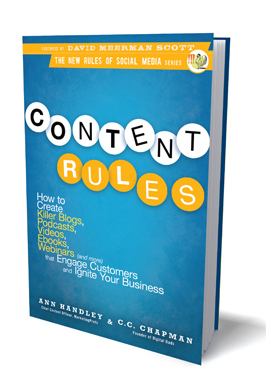Last week, I highlighted a book
called Content Rules, written by Ann Handley & C.C. Chapman. Content
Rules shows how any small business, even a local real estate office, can
harness marketing power by becoming a micro-publisher. You may want
to read Part 1 of this discussion before continuing, to avoid missing anything.

There are great benefits to becoming a content provider on the internet. For example, Mike Volpe, a VP of marketing at HubSpot, recently reported companies that blog (i.e. produce content) generate 55% more website traffic when compared to companies that don’t. In addition to more traffic, companies that produce content recieve 97% more links coming into their sites.
Despite the obvious benefits of micro-publishing, most companies are hesitant to commit to regularly producing content. The question we often get from owners and managers is, “How could I possibly do this? It seems complex, a little overwhelming, and a lot of work!”
Yes, it is going to take some work—there is no way around that. But, the complexity can be reduced if you start the process with a plan and a set of principles. Complex Rules has published a simple framework that can help anyone get started down the path of micro-publishing. There are 11 of these best practices in the book, here are the best six (in my opinion):
1. “Embrace being a publisher” – Put your quality content online: blogs, videos, podcasts, email newsletters, ebooks, white papers, tweets, webinars, photos and images.
2. “Build momentum” – Set a clear goal. Make sure your content includes triggers that compel users to take actions that will eventually result in buying your products and services. Content itself does not sell; it sets up the sale by giving useful information.
3. “Speak human” – Adopt a natural voice online. Don’t put on airs. Avoid jargon, such as “impactful,” “synergy,” “proactive,” “end-to-end,” “win-win” and “leverage” used as a verb. “Write the way you talk.”
4. “Share or solve; don’t shill” – Your content’s purpose is not to sell, but to educate and inform. This engages people and causes a favorable reaction to your firm. To illustrate: The Pampers division of Procter & Gamble produces online “Welcome to Parenthood” videos. The videos don’t sell diapers; they inform new parents about babies, and cover topics such as “potty training,” naps, etc...
5. “Do something unexpected” – Customers love it when you or your firm does things differently. To gain attention, surprise your online visitors. This works well for B2B firms that want to stand out from their competition.
6. “Play to your strengths” – You don’t have to produce the web’s most entertaining videos, podcasts, or blogs, but you must publish some type of quality material online.
To wrap up this discussion, I want to connect micro-publishing principles to recruiting. It is self-evident that publishing great content will help your real estate office be more successful at satisfying customers and selling more real estate. But can it also help you recruit experienced agents more successfully?
Yes it can—because attraction is always more powerful than promotion.
Experienced agent recruiting is dominated by promotional activities. Cold calls, direct emails, staged networking events, etc. are the tools that most real estate managers are using to recruit experienced agents. Like the direct mail companies who soliciate new card customers, this strategy does produce some results when executed with a high level of persistence. However, both candidates and managers often get weary in this process.
If you think you can outlast your competitors in the application of these promotional activities, go for it. But you better hope they don't find out how to attract agents to their cause. If you think about it, Apple didn't become the most valuable company in the world by promoting their products. They created something compelling and figured out how to attract people to it.
By becoming a successful micro-publisher and providing great content in your local community, you position yourself as an attractive thought-leader. Successful real estate agents want insightful information and they want to be connected to intersting and influential people. If you become a source for compelling information, you’ll have agents congregating around you. That is every hiring manager's dream.
Join the WorkPuzzle Discussion at the Tidemark Online Community (TMOC)
Engage in the WorkPuzzle discussion by joining the TMOC private social network. Commenting on a public blog like WorkPuzzle can be a little intimidating, so why not join the discussion inside the privacy of the TMOC discussion group?
By joining TMOC, you'll get to see who else is in the group and your comments will only be seen by those whom you trust. Joining TMOC is quick, easy, and free (no kidding…this takes less than 2 minutes). To get started, click here.
Already of a member of TMOC? If so, join the WorkPuzzle Dialog Group by clicking on the WorkPuzzle Group icon on the left side of your TMOC homepage. Questions? Email the WorkPuzzle editor (workpuzzle@hiringcenter.net) and we'll walk through the process.
 Editor's Note: This article was written by Ben Hess. Ben is the Founding Partner and Managing Director of Tidemark, Inc. and a regular contributor to WorkPuzzle.
Editor's Note: This article was written by Ben Hess. Ben is the Founding Partner and Managing Director of Tidemark, Inc. and a regular contributor to WorkPuzzle.




Comments